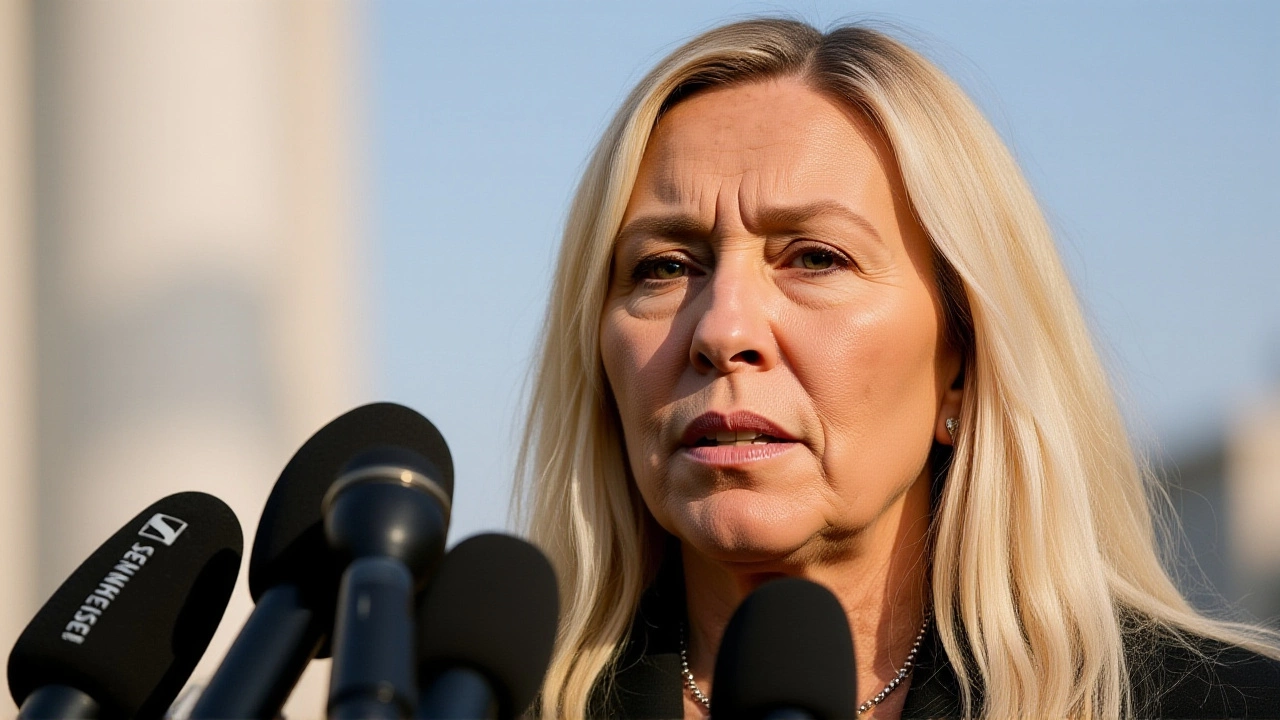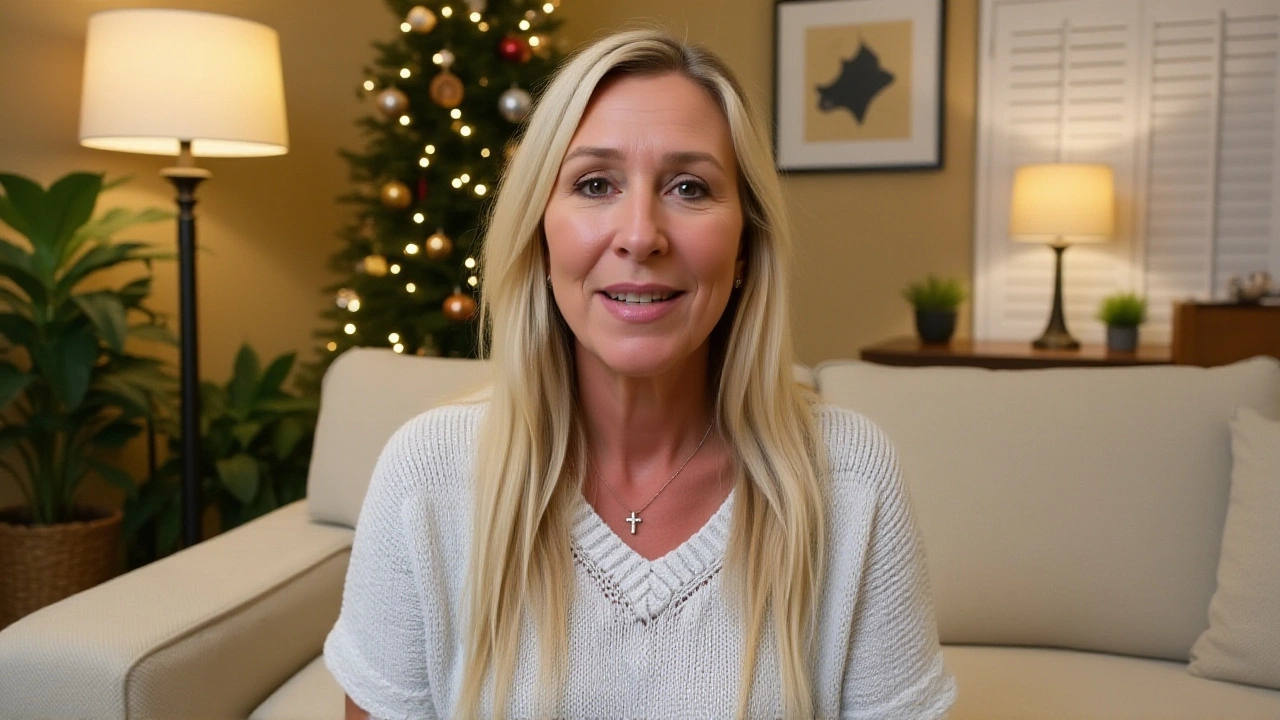Just hours after Marjorie Taylor Greene stunned Washington with a surprise resignation announcement, Donald J. Trump fired back — not with policy, but with a single, biting phrase: "Green is resigning because of quote plummeting poll numbers." The exchange, unfolding over a single weekend in November 2025, marks one of the most dramatic fractures in modern Republican politics. Greene, the fiery Congresswoman from Georgia, confirmed Friday night she would leave the U.S. House of Representatives in early January 2026 — nearly a full year before her term ends. Her reason? She didn’t want her district dragged through a bitter primary battle fueled by the very president she helped elect.
A Fallout Years in the Making
The tension between Greene and Trump wasn’t sudden. It had been simmering since early 2025, when Trump began publicly distancing himself from her most controversial statements. By summer, GOP leadership in the House quietly sidelined her from key committee assignments. Sources close to the party say internal memos warned that Greene’s presence was becoming a liability in suburban districts. But the breaking point came in October, when Trump endorsed a little-known challenger in Georgia’s 14th District — a move Greene interpreted as a direct threat. "I have fought harder than almost any other elected Republican to elect Donald Trump," she wrote in her resignation post. "I do not want my sweet district to have to endure a hurtful and hateful primary against me by the president that we all fought for." The phrase "sweet district" stuck. It was both a sentimental nod to her rural and exurban constituents — many of whom still adore her — and a subtle dig at Trump’s decision to pit Republican against Republican. Greene’s district, though not officially numbered in the report, is widely understood to be Georgia’s 14th, a rapidly changing area that includes parts of the Atlanta metro’s outer rings and stretches into rural northeast Georgia. It’s a district that flipped Republican in 2010, then leaned harder right after 2016 — and now, according to insiders, is beginning to fray.Trump’s Response: Polls, Not Policy
Trump’s reply on Saturday morning was classic: terse, personal, and designed to dominate the news cycle. His social media post, timestamped by CBS News at 723 milliseconds into their Saturday Morning broadcast, offered no policy counterargument — just a dismissal wrapped in skepticism. "Plummeting poll numbers," he wrote. No data. No source. Just a headline. And yet, it worked. Within an hour, #GreeneResigns trended nationwide. The implication was clear: she’s not leaving because of principle. She’s leaving because she’s losing. But here’s the twist: no public poll has confirmed Trump’s claim. In fact, a late October survey from the University of Georgia Polling Institute showed Greene still leading her potential challengers by 18 points — even among independents. So why the sudden exit? Greene’s own words suggest it’s less about polls and more about power. "I felt threatened by the president," she told allies in private messages, according to a source who asked not to be named. "It wasn’t just the endorsement. It was the silence from the rest of the leadership. They let him do it."The Ripple Effects: A Special Election and a Party in Turmoil
Under House rules, a special election must be held within exactly 40 days of Greene’s departure — meaning voters in her district will head to the polls by early February 2026. That’s less than six months before the November 2026 midterms, which will determine control of the House. The timing is explosive. With the 119th United States Congress already in session since January 3, 2025, this vacancy could become a testing ground for Trump’s influence — and a warning sign for the GOP’s broader health. Greene didn’t mince words about the party’s future. "The Republican Party will likely lose in the midterm elections next year," she wrote. Her prediction wasn’t born of despair — it was strategic. She’s signaling that the party’s internal wars are costing it more than just seats. She also criticized GOP leadership for failing to extend expiring Affordable Care Act tax credits — credits that help nearly 120,000 Georgians afford insurance. "They let those credits expire while we argued over who gets to be Trump’s favorite," she said in a recorded interview last week.
What’s Next? The Battle for Georgia’s 14th
The field for the special election is already forming. At least three Republicans have announced exploratory committees, including a former state senator with ties to Trump and a moderate county commissioner who’s already courting suburban women. Democrats, long written off in this district, are quietly recruiting a former military officer who served in Afghanistan — a candidate they believe could turn out young voters and independents. The race won’t just decide a seat. It’ll reveal whether Trump’s brand of politics still dominates the GOP base — or whether voters are ready to move on. Meanwhile, Greene says she plans to stay active in politics. "I’m not going anywhere," she told reporters. "I’ll be right here, watching them try to replace me." Whether she runs for governor in 2026 or launches a national media platform remains unclear. But one thing’s certain: her exit from Congress doesn’t mean the end of her influence. It just changes the battlefield.Why This Matters Beyond Georgia
This isn’t just about one congressman leaving. It’s about the GOP’s soul. For years, Trump and his allies have claimed loyalty as the highest virtue. Now, the party’s most loyal ally is walking away — not because she’s been defeated, but because she doesn’t trust the system anymore. If other Trump loyalists follow suit — and early signs suggest they might — the party could face a wave of resignations ahead of 2026. That’s not just a political problem. It’s an existential one. The irony? Greene’s resignation might be the one thing that unites the GOP’s fractured wings — not because they agree, but because they’re all afraid of what comes next.Frequently Asked Questions
Why did Marjorie Taylor Greene resign before her term ended?
Greene resigned to avoid a primary challenge backed by President Donald Trump and Republican leadership, which she viewed as a betrayal after years of unwavering support. She stated she didn’t want her district to endure a "hurtful and hateful" internal fight, suggesting the pressure from Trump’s camp made her position untenable — even though her polling numbers remained strong in private surveys.
What does Trump’s claim about "plummeting poll numbers" mean?
Trump offered no evidence to support his claim. Independent polling from the University of Georgia in October 2025 showed Greene leading potential challengers by 18 points. His statement appears to be a rhetorical tactic — not a factual rebuttal — meant to undermine her credibility and justify his endorsement of a rival candidate, even as his own allies remained silent.
When will the special election for Georgia’s congressional seat take place?
By law, a special election must be held within 40 days of Greene’s official resignation, which is expected in early January 2026. That means voting will likely occur by February 12, 2026 — just months before the November 2026 midterm elections. The timing makes this race a critical bellwether for GOP unity and voter sentiment heading into the next national vote.
How does Greene’s resignation affect the 2026 midterm elections?
Greene warned the GOP will likely lose control of the House in 2026, citing internal division and neglect of key issues like expiring Affordable Care Act tax credits that affect 120,000 Georgians. Her exit could embolden Democrats to target the district, while Republican infighting may depress turnout. If the special election results in a Democratic win or a weakened Republican nominee, it could signal broader vulnerability across swing districts.
Is Marjorie Taylor Greene done with politics?
Absolutely not. Greene has hinted at running for Georgia governor in 2026 or launching a national conservative media platform. Her resignation from Congress is a strategic retreat, not an exit. She retains massive social media reach and deep loyalty among Trump’s base — making her one of the most influential unelected figures in the party, even without a seat in Washington.
